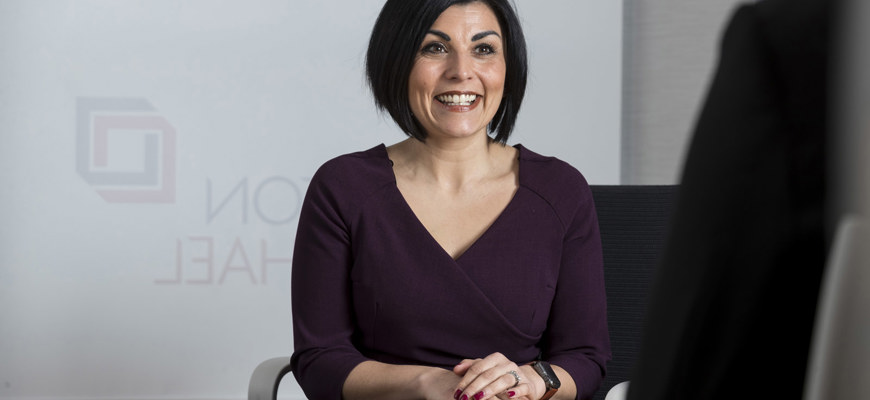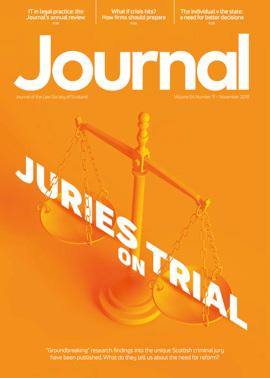Playing Noah

Tell us about your career path to date.
I always like to take up a challenge, and when an opportunity presents itself, I tend to think it’s fate! I had a fantastic traineeship and worked as a solicitor at Harper Macleod where I had real exposure to a whole variety of areas and clients.
I took on my first in-house role at Student Loans Company in 2008, and soon after became the Legal & Compliance manager in charge of a large team with a very wide scope. During this time, I realised the positive influence that a legal counsel can have as a “trusted adviser” in the effective running of an organisation, providing both strategic and operational advice to the CEO, board and executive management teams.
I recognised early in my in-house career that being a good general counsel was about far more than the ability to be technically legally competent (those skills are held by many): the intangible piece was actually in providing effective solutions to real problems and using those carefully honed legal skills to be everything from the moral compass of the organisation to the calm voice of reason in a crisis.
In 2014 I moved to act in a general counsel and company secretary role at an offshore renewable energy company, where I further expanded my remit to bring together a range of support functions under my leadership, from legal and commercial to procurement, HR, risk and reporting. Last year I was approached by Johnston Carmichael, accountants and business advisers, to be their first general counsel and head of Risk & Compliance, and it seemed like such an exciting opportunity to demonstrate the impact of effective governance risk and compliance in a professional services firm that it was one I didn’t want to miss.
Does the GC role go hand in hand with the risk and compliance function, or are you wearing two different hats for your organisation?
A good GC has tentacles in every limb of the organisation, but often organisational structures split legal from compliance and what you end up with is a range of siloed advice. From the moment I went in-house, intuitively I could see how the combination of legal skills, commercial prowess and being clear on impact and likelihood of risks was actually an untapped resource and, brought together, these skills were hugely beneficial in an organisation.
You recently spoke about risk management at the Society’s In-house Best Practice course. Do you think in-house lawyers generally have a good understanding of risk? If not, should they have?
I think lawyers can articulate what the risks are – I think what they struggle with is trying to rank these risks in an order of importance – and how the risks are mitigated. This becomes hugely beneficial in providing practical advice to clients beyond highlighting the risks alone. I believe as lawyers we should be doing more than just predicting rain – we should be helping our clients to build arks.
What is “risk appetite”, and how important is it for in-house lawyers to grasp the risk appetite of their organisation?
Risk appetite is the amount of risk that an organisation is willing to take and tolerate in the pursuit of its objectives. But it’s more than just setting limits on what you can or can’t do. It’s about setting up a framework for each part of a business to operate in; it’s about recognising where and when you can take risks to drive your business forward and how you can do that in the most considered way possible.
In-house lawyers and compliance teams are often seen as the blockers in an organisation – the team that says NO. If we can help an organisation to articulate risk appetite and embed that into its culture, we can ensure the people within the organisation understand those boundaries and work with a much clearer view of what our clients are trying to achieve and how much risk they are willing to take to get there. It leads to much greater conscious decision-making and allows us to work towards solutions.
You’ve also got non-executive director roles at Citizens Advice Scotland and the Govan Community Project. What do you value about these additional positions and what skills or experience do they add?
I think both these roles help me see things from the other side and it’s a way of using my skills for the benefit of others. As solicitors we understand the value of advice and the impact that can have, but advice is often unaffordable for many people. Both these organisations seek to equip people with advice and guidance which in itself empowers people to make good decisions. For me, the quality of advice can’t be compromised even where it is free.
What are the key challenges for in-house teams as we head towards 2020? How does the future look for in-house lawyers?
I think the opportunities for in-house lawyers are only increasing, and with the right balance of skills we should be coming out from the shadows in organisations to provide really impactful, holistic advice that is steering organisations in the right direction.
What are the current hot topics in your sector?
The impact of technology and, more generally, trust in the accountancy sector are huge issues that we are grappling with at the moment. I think there is a bit of a crisis of trust generally and as professionals we really need to work hard to emphasise our role as trusted advisers. In a new world where AI and other digital technologies will make some of the more basic processing skills redundant, we do need to remind ourselves of the influence we will still need to have alongside these technologies, and for me that takes us back to basic principles of ethics, integrity and using professional judgment appropriately.
There’s a lot of discussion just now around “legal tech” and its value in making a law department more efficient. Do you use technology solutions to help with your role?
I use some and I probably could be using more! What I would say is, you can have all the shiny tools in the world but if you don’t understand what it is you are trying to get them to tell you or how you use them effectively, they won’t deliver the real value you need them to.
Lawyers aren’t generally seen as being very innovative. Would you agree? What have you done in any of your roles that has been innovative for your team or organisation?
It really depends on your definition of innovation. I see innovation as a desire to do things better, to respond to different challenges and to shape-shift accordingly. The biggest innovation I bring to any organisation is seeing the role of their in-house counsel in a completely different light. It’s not about getting advice on discrete issues in isolation – it’s about solving problems in a practical way.
How have attitudes and working practices in the legal profession changed since you started out?
I think we all have a responsibility to keep this change moving in the right direction. In the early days of my career, it was almost a badge of honour to be working all hours and as a result, senior roles were largely dominated by men. I have two young children and my husband and I both work full time, so there are times when I need to be flexible – but it doesn’t detract from my effectiveness or productivity. My experience then impacts those who work with me and as a result I am much more output focused.
What advice would you give lawyers who want to start a career in-house? What makes a good in-house lawyer?
I think the best advice is to think beyond the law alone. A good in-house lawyer never gives theoretical advice in isolation: they are using their legal skills to provide the backdrop and context and then come up with a solution.
What are your thoughts on training in-house versus training in private practice?
I think going in-house actually makes you a better solicitor, as you start to understand better what clients need and want. I certainly think it was on-the-job experience that honed my skills, and branching into areas such as risk or project management made me realise that it actually helped me to do my job better. I think we could be preparing people better by focusing more on training in these skills.
What is your most unusual/amusing work experience?
My career is filled with bizarre moments – from providing French translation during rugby disciplinary tribunals to stalling the car with a prominent Scottish football manager inside while trying to reverse park outside the employment tribunal in front of several journalists – you can’t really take yourself too seriously.
Finally, what do you love about your job, and what do you love doing when the working day is done?
I actually love coming up with solutions and cutting through noise. When the working day is done, I am partial to a glass of wine and a dance in the kitchen with Spotify on!






